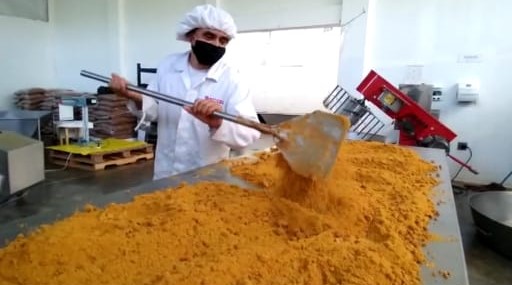Country: Guatemala
Sector: Coffee, honey and whole brown sugar (panela)
Add-on investment: Construction of warehouse for storage of coffee and honey, next to existing hulling factory
- Total estimated capital expenditure: USD 1.100.000
- Investment type: Subordinated loan
- Investment by Kampani: USD 887.000 (USD 370K for 9 months; USD 517K for 6.5 years)
- Co-investor: Local bank
- Disbursement: January 2022
Original Investment: Construction of new factory for the production of panela
- Total estimated capital expenditure: USD 674.000
- Investment type: Subordinated loan
- Investment by Kampani: USD 500.000 for 6 years
- Co-investor: Not applicable
- Disbursement: June 2017
THE BUSINESS
Federación Comercializadora de Café Especial de Guatemala (FECCEG) was created in the western highlands of Guatemala in 2006. Established as a second-tier organization of cooperatives to better manage coffee price fluctuations after the worldwide 2001-2002 price fall. Altitude in those regions varies between 1.500 and 1.800 meters above sea level.
Originally, FECCEG was a coffee producer and exporter only. For some years now, it has also been active in the production and commercialisation of organic honey and, since 2018, thanks to the Kampani investment, in organic whole sugar (panela). Nonetheless, coffee production remains by far the most important activity, reaching 95% of total sales.
THE ADD-ON INVESTMENT
In January 2022, Kampani provided an additional investment of USD 887K for FECCEG to finish building and equipping a coffee and honey warehouse on the premises of the coffee hulling factory.

The total CAPEX of USD 1.1M (excluding the cost of the land) is being financed by Kampani, FECCEG and a local bank. With this investment FECCEG will be able to save on warehouse rentals, labour and transport costs of its processed coffee, and, most importantly, increase its in-house storing capacity from 2.755 tons to 8.267 tons. The participation of Kampani on this investment is key, helping the cooperative accelerate the construction of the warehouse in time for the coffee harvest. Moreover, the fact that Kampani’s loan is not collateralized allows FECCEG to use it in its entirety as collateral for other financing needs, such as securing working capital.
ORIGINAL INVESTMENT
Kampani first added FECCEG to its portfolio of clients in June 2017. The purpose of the original financing was to build a factory for the production of organic panela (whole brown sugar). The highly fragmented nature of the traditional panela production and the threat of noxious levels of acrylamide in traditional production methods, had prevented this market from developing internationally.

THE SOCIAL IMPACT
FECCEG was founded with the mission to improve the quality of life of its members and communities by promoting fair trade and organic agriculture in rural areas, alongside better commercialisation and planning, and thus access to better prices. Currently, FECCEG has approximately 1.100 member producers, of whom 39% are women. FECCEG also steers its members towards organic agriculture, helping farmers improve their health and obtain better premiums for their crops (Fairtrade, Organic, Rainforest Alliance, others).
In summary, FECCEG integrates producers to:
- Consolidate and commercialise coffee volumes
- Provide access to premium markets
- Provide technical assistance and financing
- Add value through its processing activities
- Promote income diversification
Guatemala faces high levels of migration linked to scarce sources of income, inequality, and high criminality. FECCEG works with communities that are largely indigenous and often marginalized. A family owns an average of one hectare of land, often depleted by years of monocrops and use of pesticides. Thus, with its activities FECCEG mitigates the migration crisis by promoting local development in its community and provides solutions to common problems faced by farmers:
- Dependency on local buyers and intermediaries who pay low prices
- Lack of a value-add activities to process quality products for international markets
- Lack of access to specialized market niches in the United States and in Europe

